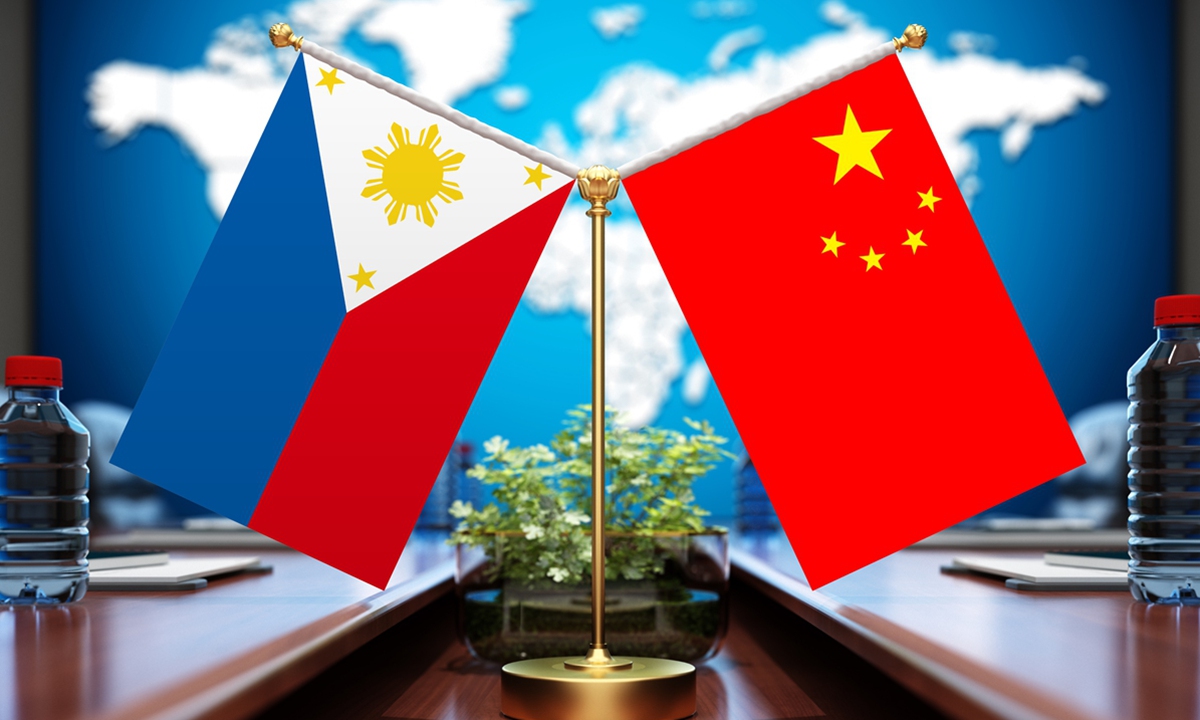
China Philippines photo:VCG
Over the past week or so, many foreign media outlets have been hyping an incident on February 6 involving Chinese and Philippine vessels in the waters off the Ren'ai Reef, which is part of China's Nansha Islands. US officials, in particular, have been clearly trying to use the incident to undermine China-Philippines ties and instigate tension in the South China Sea.
On Monday, the US State Department issued a statement, saying it "stands with our Philippine allies in upholding the rules-based international maritime order." It also issued a warning that "an armed attack on Philippine armed forces, public vessels, or aircraft, including those of the Coast Guard in the South China Sea, would invoke US mutual defense commitments." By so eagerly inserting itself into a bilateral issue between China and the Philippines, Washington lays bare its ulterior motive of trying to sabotage China-Philippines ties.
To put it bluntly, the incident has nothing to do with Washington. China and the Philippines have already held communication over the incident through diplomatic channels, according to Wang Wenbin, a spokesperson for the Chinese Foreign Ministry, on Tuesday. Wang pointed out that the South China Sea arbitration case brought by the Philippines was pure political drama orchestrated by the US. "The US frequently uses the US-Philippines mutual defense treaty to intimidate China, but it will not weaken our resolve and will to safeguard China's legitimate and lawful rights and interests," Wang told a press briefing.
With regard to the incident itself, the Philippines has accused a Chinese Coast Guard ship of directing a laser at one of its vessels. But according to Wang, it was the Philippine Coast Guard vessel that intruded into the waters off the Ren'ai Reef without Chinese permission, and the China Coast Guard ship upheld China's sovereignty and maritime order and acted in a professional and restrained way.
Needless to say, the Philippines' intrusion into Chinese waters is totally unacceptable. China's territorial sovereignty and maritime rights and interests in the South China Sea must be respected. Also, the two sides should address such issues through bilateral diplomatic channels and avoid meddling by the US or any other country. Stable China-Philippines relations are crucial for the continuous expansion of win-win cooperation between the two countries.
Just recently, China's State Council, the cabinet, approved establishing a China-Philippines joint demonstration zone for innovative economic development in Zhangzhou, East China's Fujian Province, eyeing closer cooperation in areas such as investment, trade in services and technological research and development. Last month, during Philippine President Ferdinand Romualdez Marcos Jr's visit to China, the two sides signed several deals on agricultural cooperation. They also vowed to carry forward major infrastructure projects under the Belt and Road Initiative, and agreed to resume talks on oil and gas development and explore cooperation in areas such as solar-power and wind energy. The two countries also agreed to pursue additional avenues of cooperation in the areas of defense and security, science and technology, trade and investment.
Such promising development in bilateral cooperation is undoubtedly good news for both countries and the region. The Philippines, in particular, counts China as its largest trading partner and second-largest export market. Bilateral trade hit $87.7 billion in 2022, up 7.1 percent year-on-year, Chinese customs data showed.
All of this shows that despite certain differences, China-Philippines bilateral cooperation has continued to expand and holds huge potential going forward. During Marcos' visit, the two sides also reached consensus on the peaceful resolution of disputes on the basis of the Declaration on the Conduct of Parties in the South China Sea, the United Nations Charter and the 1982 United Nations Convention on the Law of the Sea. The territorial dispute between the two sides, not to mention such isolated incidents, should not negatively impact the overall development of China-Philippines relations.
However, risks are also growing as Washington steps up its efforts in not only sabotaging China-Philippines ties but also stirring up tension in the Asia-Pacific. For example, the US said earlier this month that it has reached a deal with the Philippines that would give the US access to four more military bases in the country.
For people in the Philippines and the broader the Asia-Pacific region, building more roads, factories and businesses is always better than allowing the US to build more military bases in their backyard. We cannot allow the US' meddling and warmongering to undermine regional cooperation.
The author is a reporter with the Global Times. bizopinion@globaltimes.com.cn



